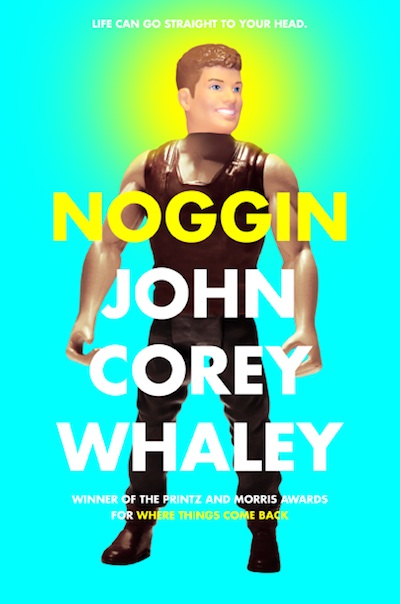5 Reasons You Must Read John Corey Whaley’s Noggin
“Listen: I was alive once and then I wasn’t.”
It won’t be the first or last YA book to make me cry, but John Corey Whaley’s Noggin blindsided me with its emotional punch. It follows terminally ill teen Travis, whose head was removed and cryogenically frozen on the off chance that, at some point in the far future, technology would exist to attach him to a healthy donor body and bring him back to life.
Just five years and one successful surgery later, he wakes up. His parents, best friend, and girlfriend—the whole world—have moved on without him. But, thanks to Travis’s tenuous absence, his loved ones have also kept one foot in the past, for better or worse. It’s a high-concept book with a giant heart, and it’s one of the best things I’ve read this year. Here’s why you shouldn’t miss it:
The emotional insight. The epigraph that opens the book is from Kurt Vonnegut’s Slaughterhouse-Five, and Noggin’s first line (“Listen: I was alive once and then I wasn’t”) echoes the most famous line from Vonnegut’s masterpiece: “Listen: Billy Pilgrim has become unstuck in time.” And Whaley’s combination of a killer, crazy original, sci-fi-ish premise with an incredible, ever-unfurling emotional arc earns him the Vonnegut comparison in a big way.
The sci-fi scenario, brought down to earth. Remember how in Groundhog Day Bill Murray hits every emotional high and low you can think of as an arrogant local newsman forced to live a single day over and over again? Confusion. Happy hedonism. Perfectionism. Demand for understanding. Depression. Suicidal depression. In Noggin, Whaley doesn’t miss a trick in portraying a kid whose head has been sutured onto someone else’s body. Does he check out his new equipment? You betcha. But…what happened to his old body below the neck? Funny you should ask. And the inevitable backlash movement against doctors playing god? That’s in here, too. Without getting bogged down in the how of it, Whaley explores every weird wrinkle of this speculative tale.
The love story. On its face, the idea of a person coming back to find that the world’s moved on might be more wrenching if written about an adult—aging parents, a rocky marriage, and growing kids could be thrown into the mix. But Whaley nails it in centering Noggin on a kid at the mercurial age of 16. When he wakes, everything is just different enough for him to feel displaced. Despite their age, his relationship with girlfriend Cate Conroy, seen in frequent flashback, feels as real and limitless as the love between my other favorite young adult pair, Eleanor and Park. You’ll truly believe that their love is the kind you’d wait years for, even if it took place entirely within the confines of their high school days. Only the best YA romance achieves that.
The respect for its teen protagonist. Though he wakes up 16 again (still?), Travis’s best friend Kyle is, of course, 21. But Whaley doesn’t waste a single sentence on questioning whether the gap between 16 and 21 (so much wider than the one between 21 and 26, or even 18 and 23) is too wide to bridge. Like Travis’s connection with Cate, his link to Kyle is stronger than that. Anyone writing great YA has respect and empathy for the relationships and headspace of their teen characters, but Whaley takes it to another level. At no point is Travis’s right to how he feels about his impossible, unprecedented situation undermined or stepped away from—though the other people in his life also have their say.
The parents. A classic (and valuable) YA trope is that of the missing or absentee parent. It reflects the often isolated, insular nature of the teen experience, and the solitude required in figuring out who you are. Adolescence is hard, man, and YA fiction so often relegates parents to the sidelines because that’s where they need to be.
But once in a while, a young adult book offers parents or parental figures as richly realized as the teens at the story’s heart. The Fault in Our Stars did it, as did Nancy Werlin’s Impossible. And Noggin does, too. It’s Travis’s story, but Whaley is generous enough to make room for the perspectives of the two people most affected by Travis’s five-year hibernation.
Have we convinced you? Are you adding Noggin to your to-read list?
